Leadership and Management in Service Sector: A Comprehensive Report
VerifiedAdded on 2022/11/28
|13
|3787
|378
Report
AI Summary
This report provides a detailed analysis of leadership and management within the service industry, using the Balmoral Hotel as a case study. It begins with an introduction to leadership and management concepts, followed by an exploration of classical management theories and their application. The report then delves into various leadership styles, including democratic, autocratic, and laissez-faire approaches, and examines their roles in motivating employees and improving performance. It also discusses management styles specific to the service sector, such as authoritative, consultative, and persuasive styles. The report further analyzes internal and external factors influencing organizational structure and management styles, utilizing SWOT and PESTLE analyses to assess the hotel's strengths, weaknesses, opportunities, threats, and external influences. Finally, the report assesses the hard and soft skills required in current and future management and leadership roles within the service industry, offering insights into the evolving demands of the sector.
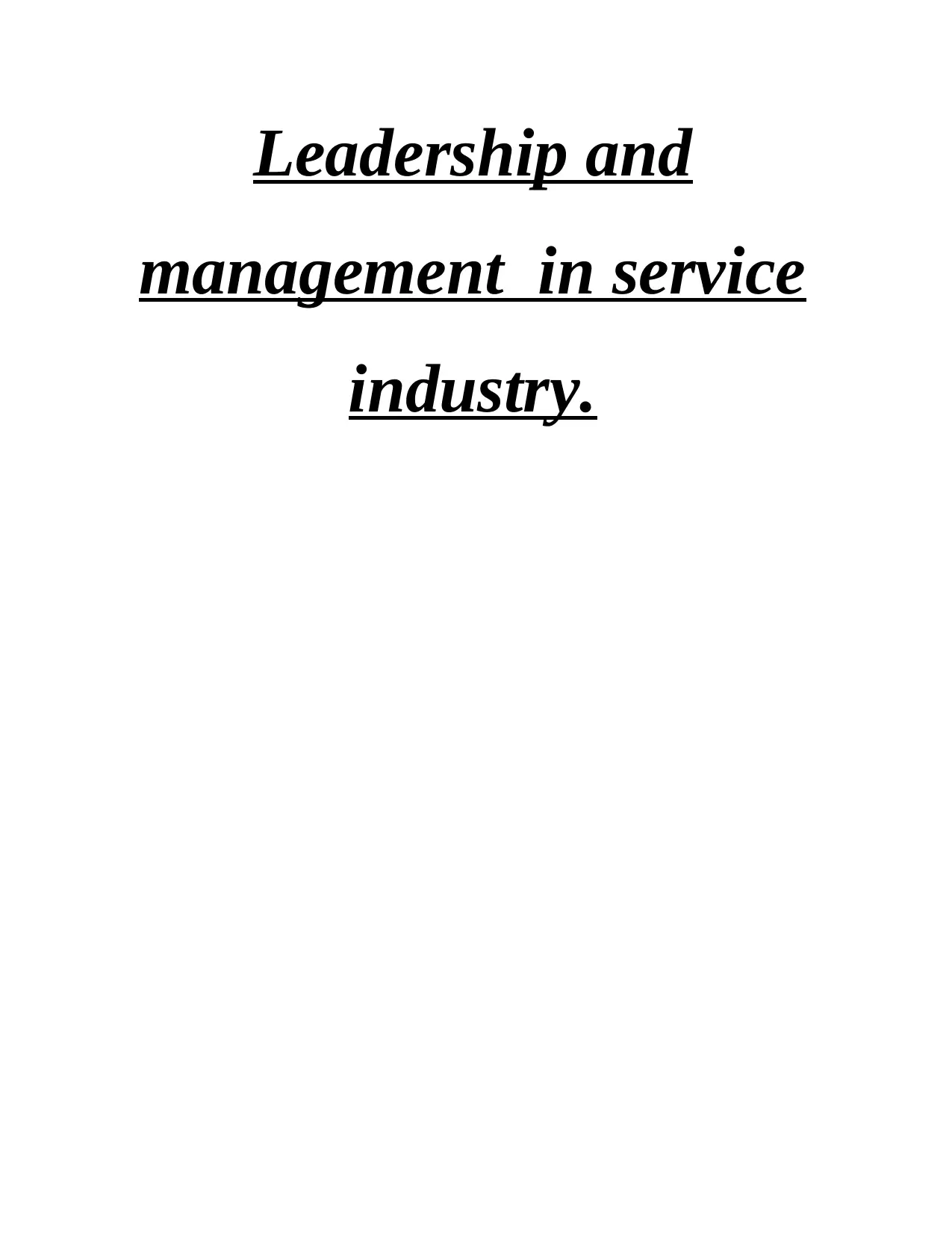
Leadership and
management in service
industry.
management in service
industry.
Paraphrase This Document
Need a fresh take? Get an instant paraphrase of this document with our AI Paraphraser
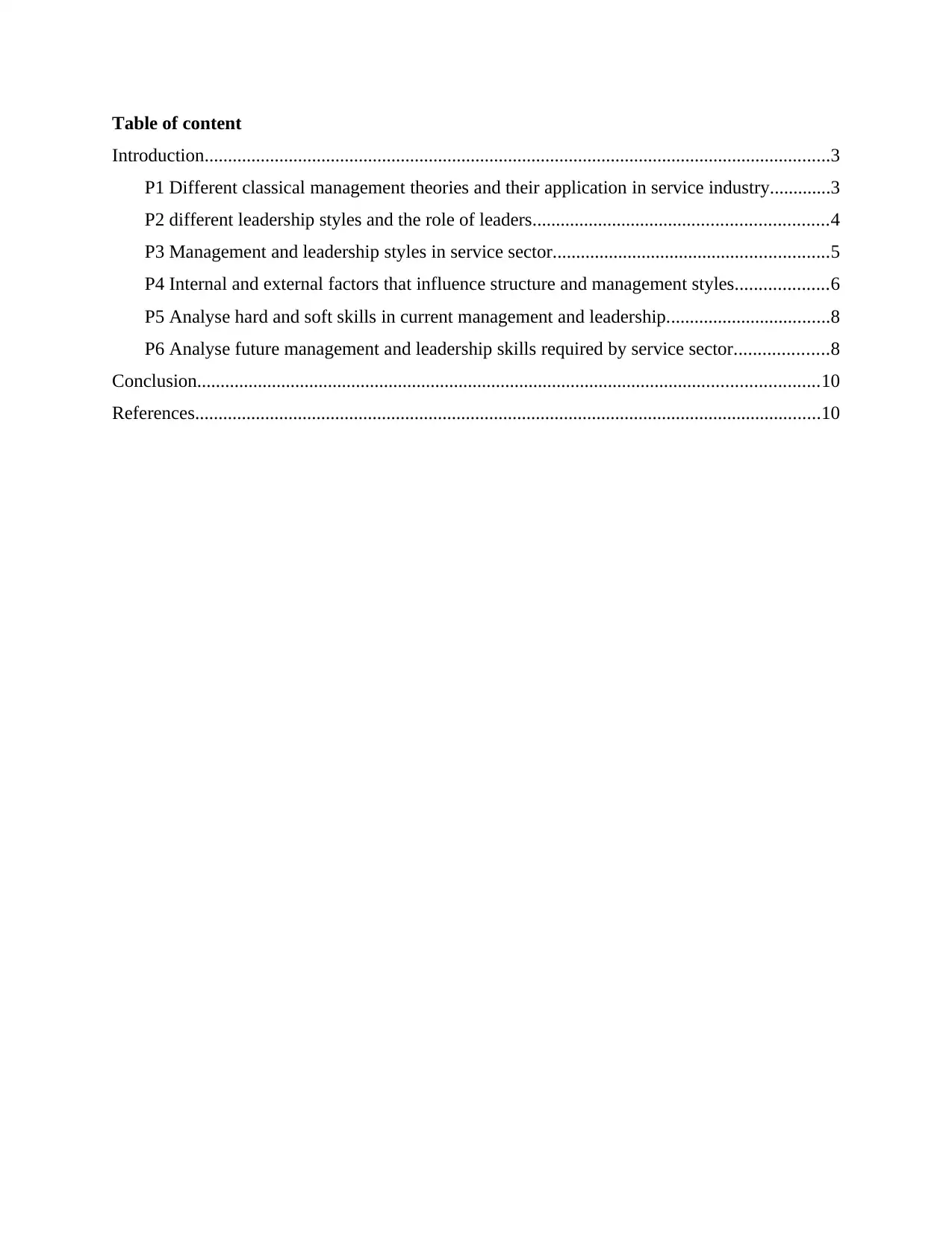
Table of content
Introduction......................................................................................................................................3
P1 Different classical management theories and their application in service industry.............3
P2 different leadership styles and the role of leaders...............................................................4
P3 Management and leadership styles in service sector...........................................................5
P4 Internal and external factors that influence structure and management styles....................6
P5 Analyse hard and soft skills in current management and leadership...................................8
P6 Analyse future management and leadership skills required by service sector....................8
Conclusion.....................................................................................................................................10
References......................................................................................................................................10
Introduction......................................................................................................................................3
P1 Different classical management theories and their application in service industry.............3
P2 different leadership styles and the role of leaders...............................................................4
P3 Management and leadership styles in service sector...........................................................5
P4 Internal and external factors that influence structure and management styles....................6
P5 Analyse hard and soft skills in current management and leadership...................................8
P6 Analyse future management and leadership skills required by service sector....................8
Conclusion.....................................................................................................................................10
References......................................................................................................................................10
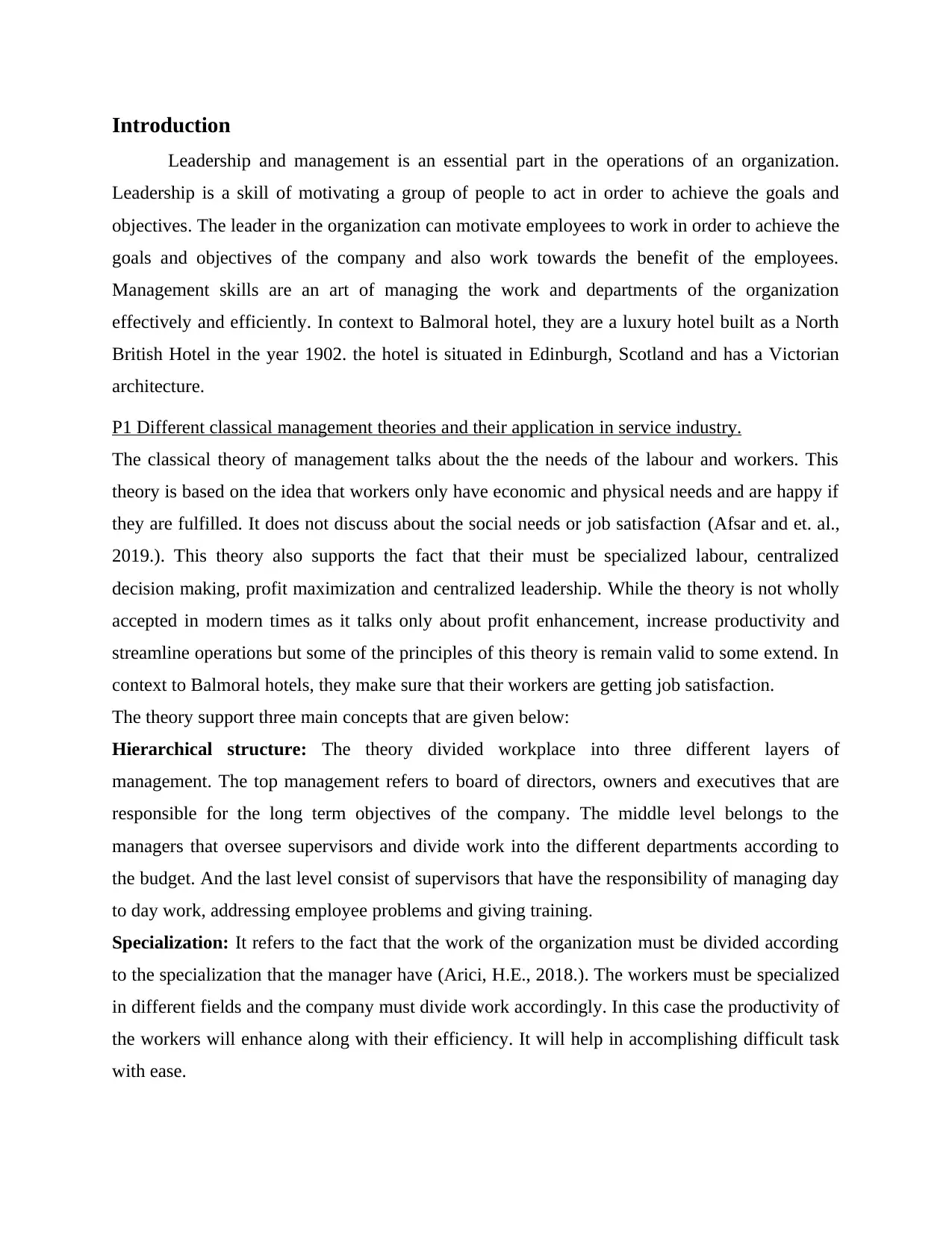
Introduction
Leadership and management is an essential part in the operations of an organization.
Leadership is a skill of motivating a group of people to act in order to achieve the goals and
objectives. The leader in the organization can motivate employees to work in order to achieve the
goals and objectives of the company and also work towards the benefit of the employees.
Management skills are an art of managing the work and departments of the organization
effectively and efficiently. In context to Balmoral hotel, they are a luxury hotel built as a North
British Hotel in the year 1902. the hotel is situated in Edinburgh, Scotland and has a Victorian
architecture.
P1 Different classical management theories and their application in service industry.
The classical theory of management talks about the the needs of the labour and workers. This
theory is based on the idea that workers only have economic and physical needs and are happy if
they are fulfilled. It does not discuss about the social needs or job satisfaction (Afsar and et. al.,
2019.). This theory also supports the fact that their must be specialized labour, centralized
decision making, profit maximization and centralized leadership. While the theory is not wholly
accepted in modern times as it talks only about profit enhancement, increase productivity and
streamline operations but some of the principles of this theory is remain valid to some extend. In
context to Balmoral hotels, they make sure that their workers are getting job satisfaction.
The theory support three main concepts that are given below:
Hierarchical structure: The theory divided workplace into three different layers of
management. The top management refers to board of directors, owners and executives that are
responsible for the long term objectives of the company. The middle level belongs to the
managers that oversee supervisors and divide work into the different departments according to
the budget. And the last level consist of supervisors that have the responsibility of managing day
to day work, addressing employee problems and giving training.
Specialization: It refers to the fact that the work of the organization must be divided according
to the specialization that the manager have (Arici, H.E., 2018.). The workers must be specialized
in different fields and the company must divide work accordingly. In this case the productivity of
the workers will enhance along with their efficiency. It will help in accomplishing difficult task
with ease.
Leadership and management is an essential part in the operations of an organization.
Leadership is a skill of motivating a group of people to act in order to achieve the goals and
objectives. The leader in the organization can motivate employees to work in order to achieve the
goals and objectives of the company and also work towards the benefit of the employees.
Management skills are an art of managing the work and departments of the organization
effectively and efficiently. In context to Balmoral hotel, they are a luxury hotel built as a North
British Hotel in the year 1902. the hotel is situated in Edinburgh, Scotland and has a Victorian
architecture.
P1 Different classical management theories and their application in service industry.
The classical theory of management talks about the the needs of the labour and workers. This
theory is based on the idea that workers only have economic and physical needs and are happy if
they are fulfilled. It does not discuss about the social needs or job satisfaction (Afsar and et. al.,
2019.). This theory also supports the fact that their must be specialized labour, centralized
decision making, profit maximization and centralized leadership. While the theory is not wholly
accepted in modern times as it talks only about profit enhancement, increase productivity and
streamline operations but some of the principles of this theory is remain valid to some extend. In
context to Balmoral hotels, they make sure that their workers are getting job satisfaction.
The theory support three main concepts that are given below:
Hierarchical structure: The theory divided workplace into three different layers of
management. The top management refers to board of directors, owners and executives that are
responsible for the long term objectives of the company. The middle level belongs to the
managers that oversee supervisors and divide work into the different departments according to
the budget. And the last level consist of supervisors that have the responsibility of managing day
to day work, addressing employee problems and giving training.
Specialization: It refers to the fact that the work of the organization must be divided according
to the specialization that the manager have (Arici, H.E., 2018.). The workers must be specialized
in different fields and the company must divide work accordingly. In this case the productivity of
the workers will enhance along with their efficiency. It will help in accomplishing difficult task
with ease.
⊘ This is a preview!⊘
Do you want full access?
Subscribe today to unlock all pages.

Trusted by 1+ million students worldwide
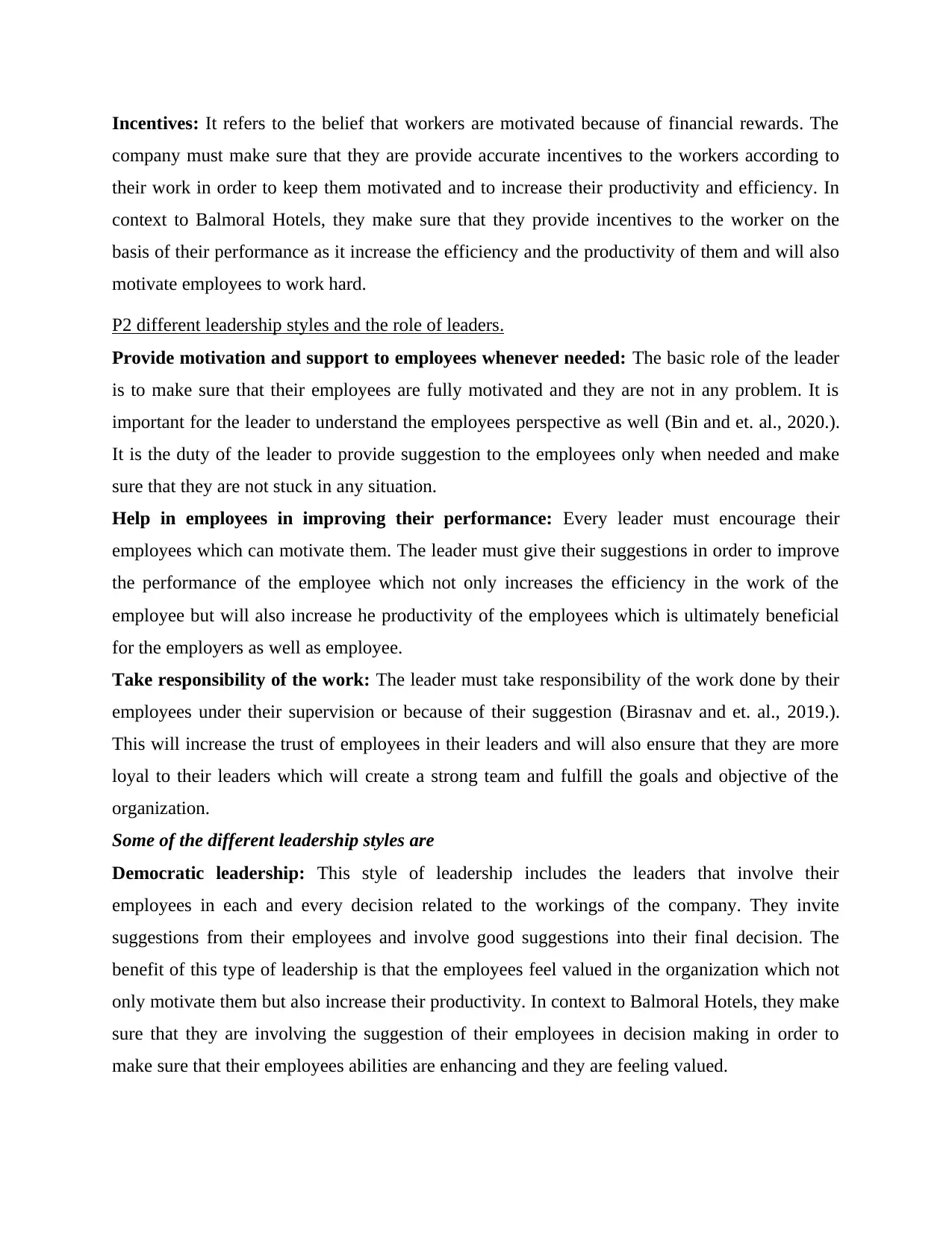
Incentives: It refers to the belief that workers are motivated because of financial rewards. The
company must make sure that they are provide accurate incentives to the workers according to
their work in order to keep them motivated and to increase their productivity and efficiency. In
context to Balmoral Hotels, they make sure that they provide incentives to the worker on the
basis of their performance as it increase the efficiency and the productivity of them and will also
motivate employees to work hard.
P2 different leadership styles and the role of leaders.
Provide motivation and support to employees whenever needed: The basic role of the leader
is to make sure that their employees are fully motivated and they are not in any problem. It is
important for the leader to understand the employees perspective as well (Bin and et. al., 2020.).
It is the duty of the leader to provide suggestion to the employees only when needed and make
sure that they are not stuck in any situation.
Help in employees in improving their performance: Every leader must encourage their
employees which can motivate them. The leader must give their suggestions in order to improve
the performance of the employee which not only increases the efficiency in the work of the
employee but will also increase he productivity of the employees which is ultimately beneficial
for the employers as well as employee.
Take responsibility of the work: The leader must take responsibility of the work done by their
employees under their supervision or because of their suggestion (Birasnav and et. al., 2019.).
This will increase the trust of employees in their leaders and will also ensure that they are more
loyal to their leaders which will create a strong team and fulfill the goals and objective of the
organization.
Some of the different leadership styles are
Democratic leadership: This style of leadership includes the leaders that involve their
employees in each and every decision related to the workings of the company. They invite
suggestions from their employees and involve good suggestions into their final decision. The
benefit of this type of leadership is that the employees feel valued in the organization which not
only motivate them but also increase their productivity. In context to Balmoral Hotels, they make
sure that they are involving the suggestion of their employees in decision making in order to
make sure that their employees abilities are enhancing and they are feeling valued.
company must make sure that they are provide accurate incentives to the workers according to
their work in order to keep them motivated and to increase their productivity and efficiency. In
context to Balmoral Hotels, they make sure that they provide incentives to the worker on the
basis of their performance as it increase the efficiency and the productivity of them and will also
motivate employees to work hard.
P2 different leadership styles and the role of leaders.
Provide motivation and support to employees whenever needed: The basic role of the leader
is to make sure that their employees are fully motivated and they are not in any problem. It is
important for the leader to understand the employees perspective as well (Bin and et. al., 2020.).
It is the duty of the leader to provide suggestion to the employees only when needed and make
sure that they are not stuck in any situation.
Help in employees in improving their performance: Every leader must encourage their
employees which can motivate them. The leader must give their suggestions in order to improve
the performance of the employee which not only increases the efficiency in the work of the
employee but will also increase he productivity of the employees which is ultimately beneficial
for the employers as well as employee.
Take responsibility of the work: The leader must take responsibility of the work done by their
employees under their supervision or because of their suggestion (Birasnav and et. al., 2019.).
This will increase the trust of employees in their leaders and will also ensure that they are more
loyal to their leaders which will create a strong team and fulfill the goals and objective of the
organization.
Some of the different leadership styles are
Democratic leadership: This style of leadership includes the leaders that involve their
employees in each and every decision related to the workings of the company. They invite
suggestions from their employees and involve good suggestions into their final decision. The
benefit of this type of leadership is that the employees feel valued in the organization which not
only motivate them but also increase their productivity. In context to Balmoral Hotels, they make
sure that they are involving the suggestion of their employees in decision making in order to
make sure that their employees abilities are enhancing and they are feeling valued.
Paraphrase This Document
Need a fresh take? Get an instant paraphrase of this document with our AI Paraphraser
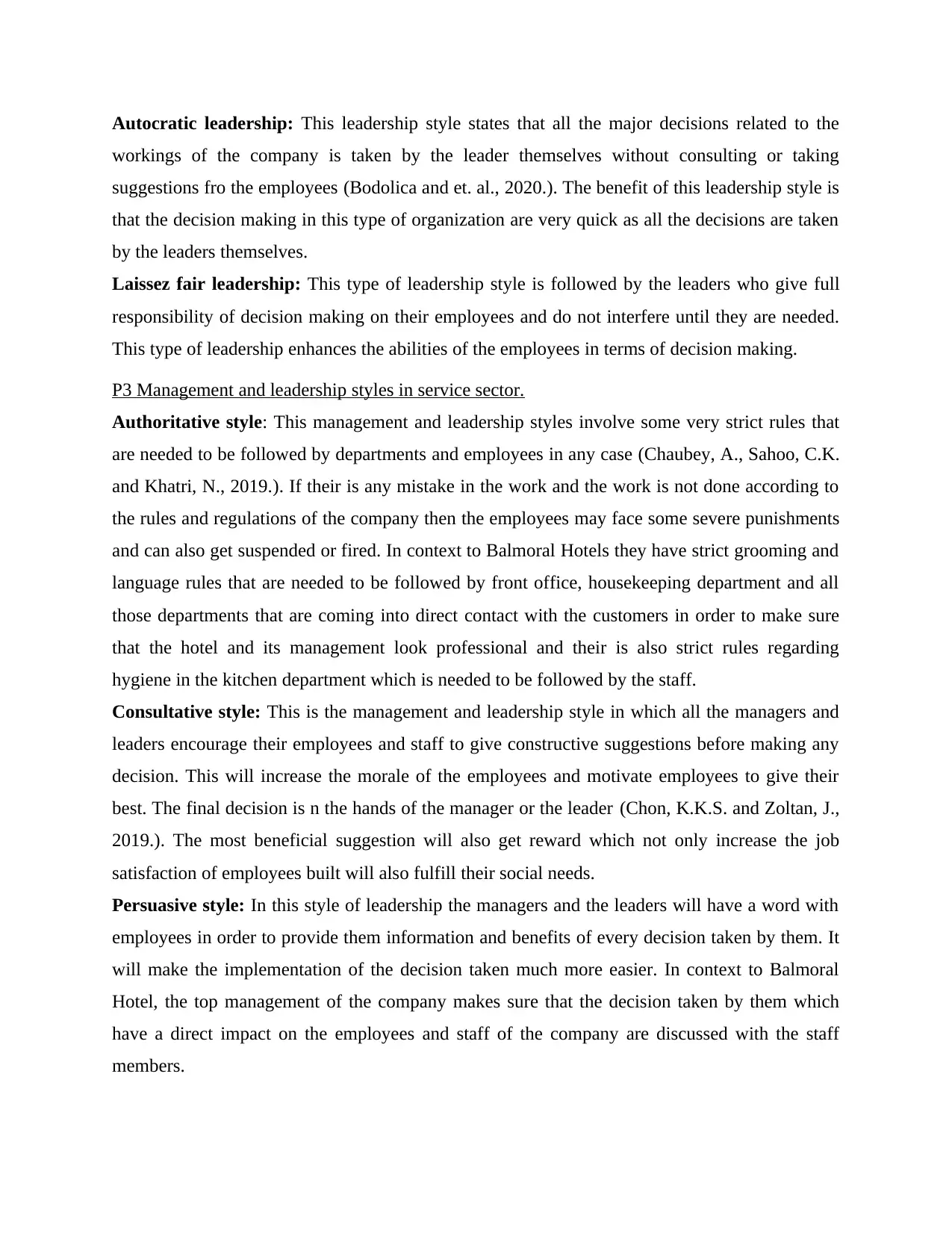
Autocratic leadership: This leadership style states that all the major decisions related to the
workings of the company is taken by the leader themselves without consulting or taking
suggestions fro the employees (Bodolica and et. al., 2020.). The benefit of this leadership style is
that the decision making in this type of organization are very quick as all the decisions are taken
by the leaders themselves.
Laissez fair leadership: This type of leadership style is followed by the leaders who give full
responsibility of decision making on their employees and do not interfere until they are needed.
This type of leadership enhances the abilities of the employees in terms of decision making.
P3 Management and leadership styles in service sector.
Authoritative style: This management and leadership styles involve some very strict rules that
are needed to be followed by departments and employees in any case (Chaubey, A., Sahoo, C.K.
and Khatri, N., 2019.). If their is any mistake in the work and the work is not done according to
the rules and regulations of the company then the employees may face some severe punishments
and can also get suspended or fired. In context to Balmoral Hotels they have strict grooming and
language rules that are needed to be followed by front office, housekeeping department and all
those departments that are coming into direct contact with the customers in order to make sure
that the hotel and its management look professional and their is also strict rules regarding
hygiene in the kitchen department which is needed to be followed by the staff.
Consultative style: This is the management and leadership style in which all the managers and
leaders encourage their employees and staff to give constructive suggestions before making any
decision. This will increase the morale of the employees and motivate employees to give their
best. The final decision is n the hands of the manager or the leader (Chon, K.K.S. and Zoltan, J.,
2019.). The most beneficial suggestion will also get reward which not only increase the job
satisfaction of employees built will also fulfill their social needs.
Persuasive style: In this style of leadership the managers and the leaders will have a word with
employees in order to provide them information and benefits of every decision taken by them. It
will make the implementation of the decision taken much more easier. In context to Balmoral
Hotel, the top management of the company makes sure that the decision taken by them which
have a direct impact on the employees and staff of the company are discussed with the staff
members.
workings of the company is taken by the leader themselves without consulting or taking
suggestions fro the employees (Bodolica and et. al., 2020.). The benefit of this leadership style is
that the decision making in this type of organization are very quick as all the decisions are taken
by the leaders themselves.
Laissez fair leadership: This type of leadership style is followed by the leaders who give full
responsibility of decision making on their employees and do not interfere until they are needed.
This type of leadership enhances the abilities of the employees in terms of decision making.
P3 Management and leadership styles in service sector.
Authoritative style: This management and leadership styles involve some very strict rules that
are needed to be followed by departments and employees in any case (Chaubey, A., Sahoo, C.K.
and Khatri, N., 2019.). If their is any mistake in the work and the work is not done according to
the rules and regulations of the company then the employees may face some severe punishments
and can also get suspended or fired. In context to Balmoral Hotels they have strict grooming and
language rules that are needed to be followed by front office, housekeeping department and all
those departments that are coming into direct contact with the customers in order to make sure
that the hotel and its management look professional and their is also strict rules regarding
hygiene in the kitchen department which is needed to be followed by the staff.
Consultative style: This is the management and leadership style in which all the managers and
leaders encourage their employees and staff to give constructive suggestions before making any
decision. This will increase the morale of the employees and motivate employees to give their
best. The final decision is n the hands of the manager or the leader (Chon, K.K.S. and Zoltan, J.,
2019.). The most beneficial suggestion will also get reward which not only increase the job
satisfaction of employees built will also fulfill their social needs.
Persuasive style: In this style of leadership the managers and the leaders will have a word with
employees in order to provide them information and benefits of every decision taken by them. It
will make the implementation of the decision taken much more easier. In context to Balmoral
Hotel, the top management of the company makes sure that the decision taken by them which
have a direct impact on the employees and staff of the company are discussed with the staff
members.
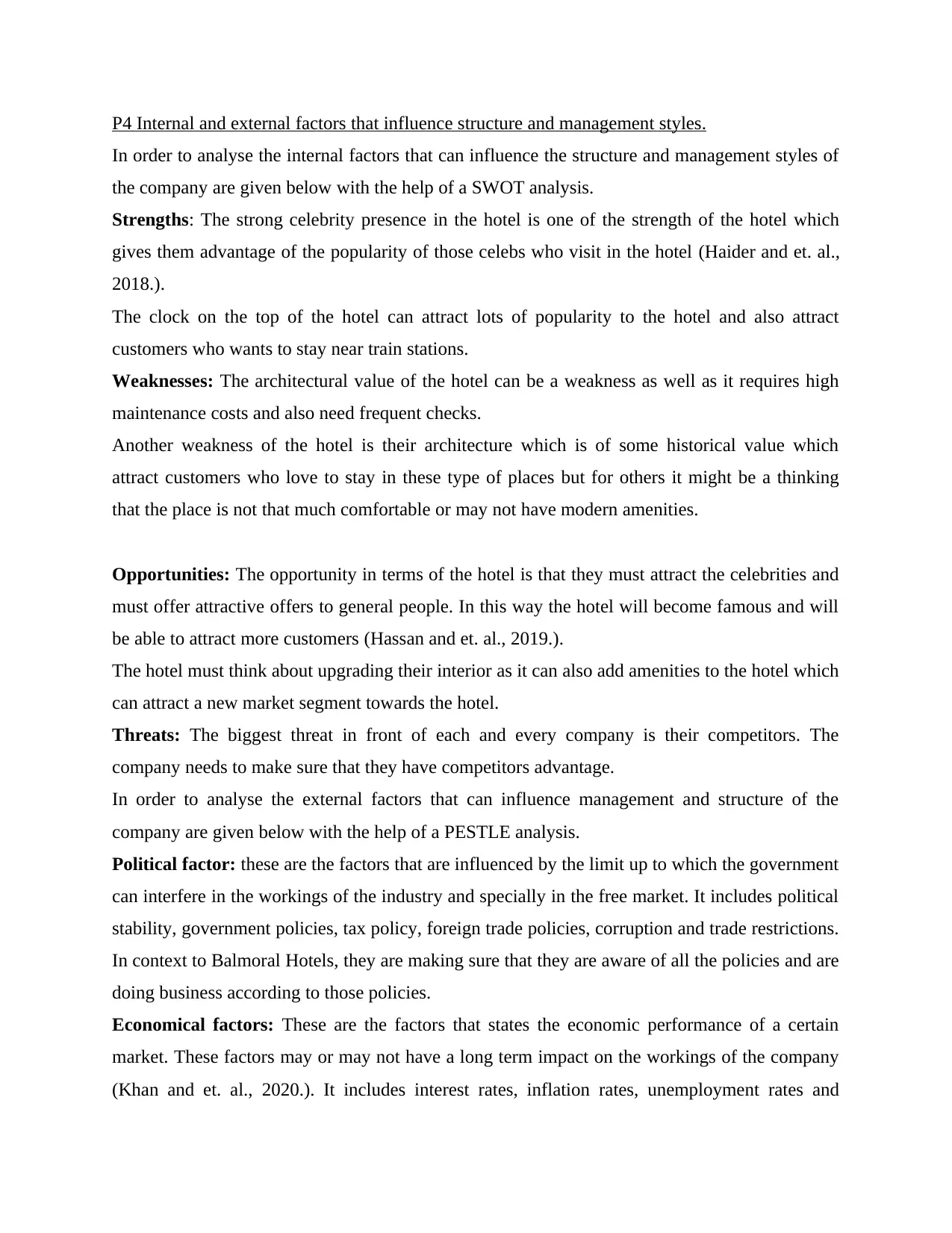
P4 Internal and external factors that influence structure and management styles.
In order to analyse the internal factors that can influence the structure and management styles of
the company are given below with the help of a SWOT analysis.
Strengths: The strong celebrity presence in the hotel is one of the strength of the hotel which
gives them advantage of the popularity of those celebs who visit in the hotel (Haider and et. al.,
2018.).
The clock on the top of the hotel can attract lots of popularity to the hotel and also attract
customers who wants to stay near train stations.
Weaknesses: The architectural value of the hotel can be a weakness as well as it requires high
maintenance costs and also need frequent checks.
Another weakness of the hotel is their architecture which is of some historical value which
attract customers who love to stay in these type of places but for others it might be a thinking
that the place is not that much comfortable or may not have modern amenities.
Opportunities: The opportunity in terms of the hotel is that they must attract the celebrities and
must offer attractive offers to general people. In this way the hotel will become famous and will
be able to attract more customers (Hassan and et. al., 2019.).
The hotel must think about upgrading their interior as it can also add amenities to the hotel which
can attract a new market segment towards the hotel.
Threats: The biggest threat in front of each and every company is their competitors. The
company needs to make sure that they have competitors advantage.
In order to analyse the external factors that can influence management and structure of the
company are given below with the help of a PESTLE analysis.
Political factor: these are the factors that are influenced by the limit up to which the government
can interfere in the workings of the industry and specially in the free market. It includes political
stability, government policies, tax policy, foreign trade policies, corruption and trade restrictions.
In context to Balmoral Hotels, they are making sure that they are aware of all the policies and are
doing business according to those policies.
Economical factors: These are the factors that states the economic performance of a certain
market. These factors may or may not have a long term impact on the workings of the company
(Khan and et. al., 2020.). It includes interest rates, inflation rates, unemployment rates and
In order to analyse the internal factors that can influence the structure and management styles of
the company are given below with the help of a SWOT analysis.
Strengths: The strong celebrity presence in the hotel is one of the strength of the hotel which
gives them advantage of the popularity of those celebs who visit in the hotel (Haider and et. al.,
2018.).
The clock on the top of the hotel can attract lots of popularity to the hotel and also attract
customers who wants to stay near train stations.
Weaknesses: The architectural value of the hotel can be a weakness as well as it requires high
maintenance costs and also need frequent checks.
Another weakness of the hotel is their architecture which is of some historical value which
attract customers who love to stay in these type of places but for others it might be a thinking
that the place is not that much comfortable or may not have modern amenities.
Opportunities: The opportunity in terms of the hotel is that they must attract the celebrities and
must offer attractive offers to general people. In this way the hotel will become famous and will
be able to attract more customers (Hassan and et. al., 2019.).
The hotel must think about upgrading their interior as it can also add amenities to the hotel which
can attract a new market segment towards the hotel.
Threats: The biggest threat in front of each and every company is their competitors. The
company needs to make sure that they have competitors advantage.
In order to analyse the external factors that can influence management and structure of the
company are given below with the help of a PESTLE analysis.
Political factor: these are the factors that are influenced by the limit up to which the government
can interfere in the workings of the industry and specially in the free market. It includes political
stability, government policies, tax policy, foreign trade policies, corruption and trade restrictions.
In context to Balmoral Hotels, they are making sure that they are aware of all the policies and are
doing business according to those policies.
Economical factors: These are the factors that states the economic performance of a certain
market. These factors may or may not have a long term impact on the workings of the company
(Khan and et. al., 2020.). It includes interest rates, inflation rates, unemployment rates and
⊘ This is a preview!⊘
Do you want full access?
Subscribe today to unlock all pages.

Trusted by 1+ million students worldwide
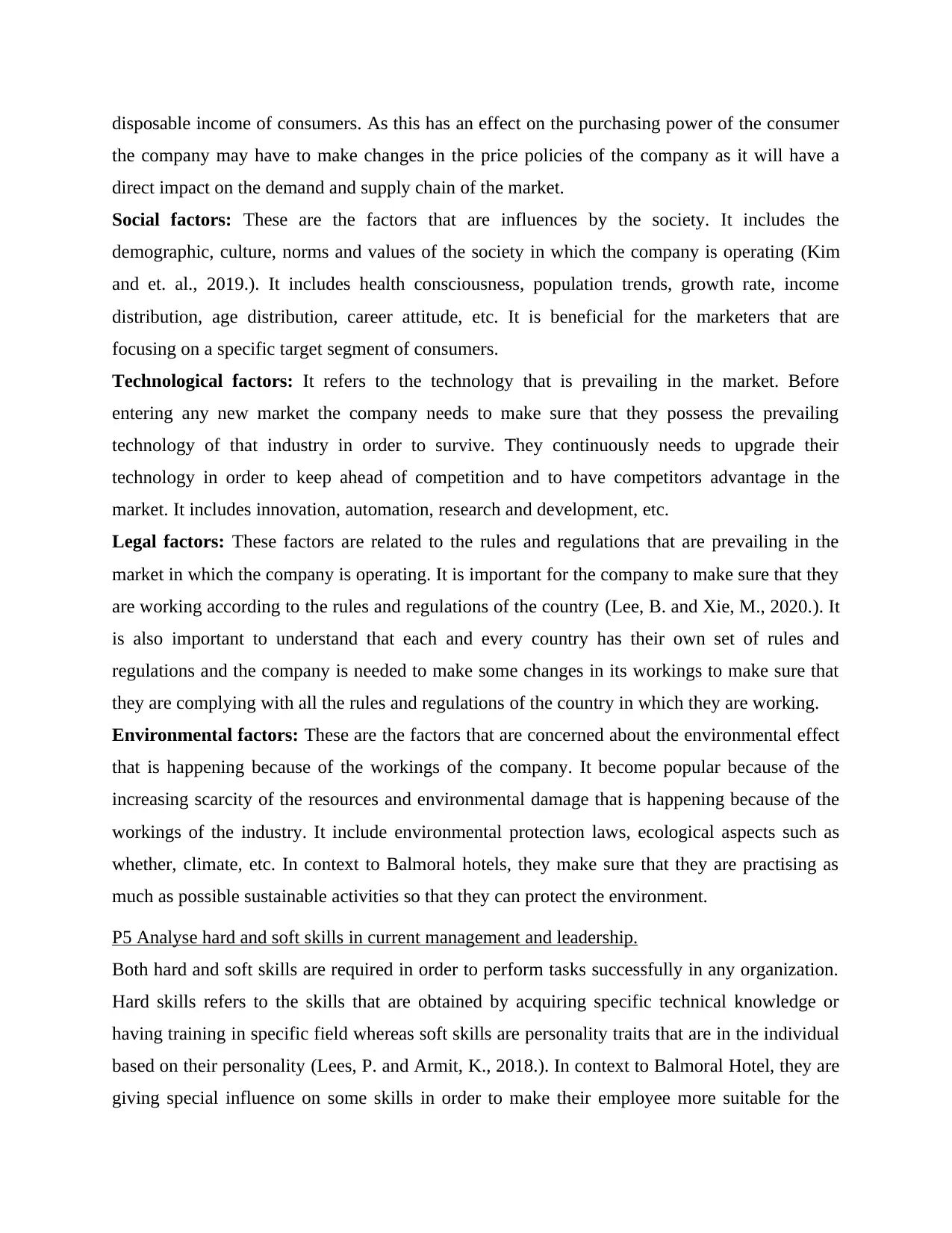
disposable income of consumers. As this has an effect on the purchasing power of the consumer
the company may have to make changes in the price policies of the company as it will have a
direct impact on the demand and supply chain of the market.
Social factors: These are the factors that are influences by the society. It includes the
demographic, culture, norms and values of the society in which the company is operating (Kim
and et. al., 2019.). It includes health consciousness, population trends, growth rate, income
distribution, age distribution, career attitude, etc. It is beneficial for the marketers that are
focusing on a specific target segment of consumers.
Technological factors: It refers to the technology that is prevailing in the market. Before
entering any new market the company needs to make sure that they possess the prevailing
technology of that industry in order to survive. They continuously needs to upgrade their
technology in order to keep ahead of competition and to have competitors advantage in the
market. It includes innovation, automation, research and development, etc.
Legal factors: These factors are related to the rules and regulations that are prevailing in the
market in which the company is operating. It is important for the company to make sure that they
are working according to the rules and regulations of the country (Lee, B. and Xie, M., 2020.). It
is also important to understand that each and every country has their own set of rules and
regulations and the company is needed to make some changes in its workings to make sure that
they are complying with all the rules and regulations of the country in which they are working.
Environmental factors: These are the factors that are concerned about the environmental effect
that is happening because of the workings of the company. It become popular because of the
increasing scarcity of the resources and environmental damage that is happening because of the
workings of the industry. It include environmental protection laws, ecological aspects such as
whether, climate, etc. In context to Balmoral hotels, they make sure that they are practising as
much as possible sustainable activities so that they can protect the environment.
P5 Analyse hard and soft skills in current management and leadership.
Both hard and soft skills are required in order to perform tasks successfully in any organization.
Hard skills refers to the skills that are obtained by acquiring specific technical knowledge or
having training in specific field whereas soft skills are personality traits that are in the individual
based on their personality (Lees, P. and Armit, K., 2018.). In context to Balmoral Hotel, they are
giving special influence on some skills in order to make their employee more suitable for the
the company may have to make changes in the price policies of the company as it will have a
direct impact on the demand and supply chain of the market.
Social factors: These are the factors that are influences by the society. It includes the
demographic, culture, norms and values of the society in which the company is operating (Kim
and et. al., 2019.). It includes health consciousness, population trends, growth rate, income
distribution, age distribution, career attitude, etc. It is beneficial for the marketers that are
focusing on a specific target segment of consumers.
Technological factors: It refers to the technology that is prevailing in the market. Before
entering any new market the company needs to make sure that they possess the prevailing
technology of that industry in order to survive. They continuously needs to upgrade their
technology in order to keep ahead of competition and to have competitors advantage in the
market. It includes innovation, automation, research and development, etc.
Legal factors: These factors are related to the rules and regulations that are prevailing in the
market in which the company is operating. It is important for the company to make sure that they
are working according to the rules and regulations of the country (Lee, B. and Xie, M., 2020.). It
is also important to understand that each and every country has their own set of rules and
regulations and the company is needed to make some changes in its workings to make sure that
they are complying with all the rules and regulations of the country in which they are working.
Environmental factors: These are the factors that are concerned about the environmental effect
that is happening because of the workings of the company. It become popular because of the
increasing scarcity of the resources and environmental damage that is happening because of the
workings of the industry. It include environmental protection laws, ecological aspects such as
whether, climate, etc. In context to Balmoral hotels, they make sure that they are practising as
much as possible sustainable activities so that they can protect the environment.
P5 Analyse hard and soft skills in current management and leadership.
Both hard and soft skills are required in order to perform tasks successfully in any organization.
Hard skills refers to the skills that are obtained by acquiring specific technical knowledge or
having training in specific field whereas soft skills are personality traits that are in the individual
based on their personality (Lees, P. and Armit, K., 2018.). In context to Balmoral Hotel, they are
giving special influence on some skills in order to make their employee more suitable for the
Paraphrase This Document
Need a fresh take? Get an instant paraphrase of this document with our AI Paraphraser
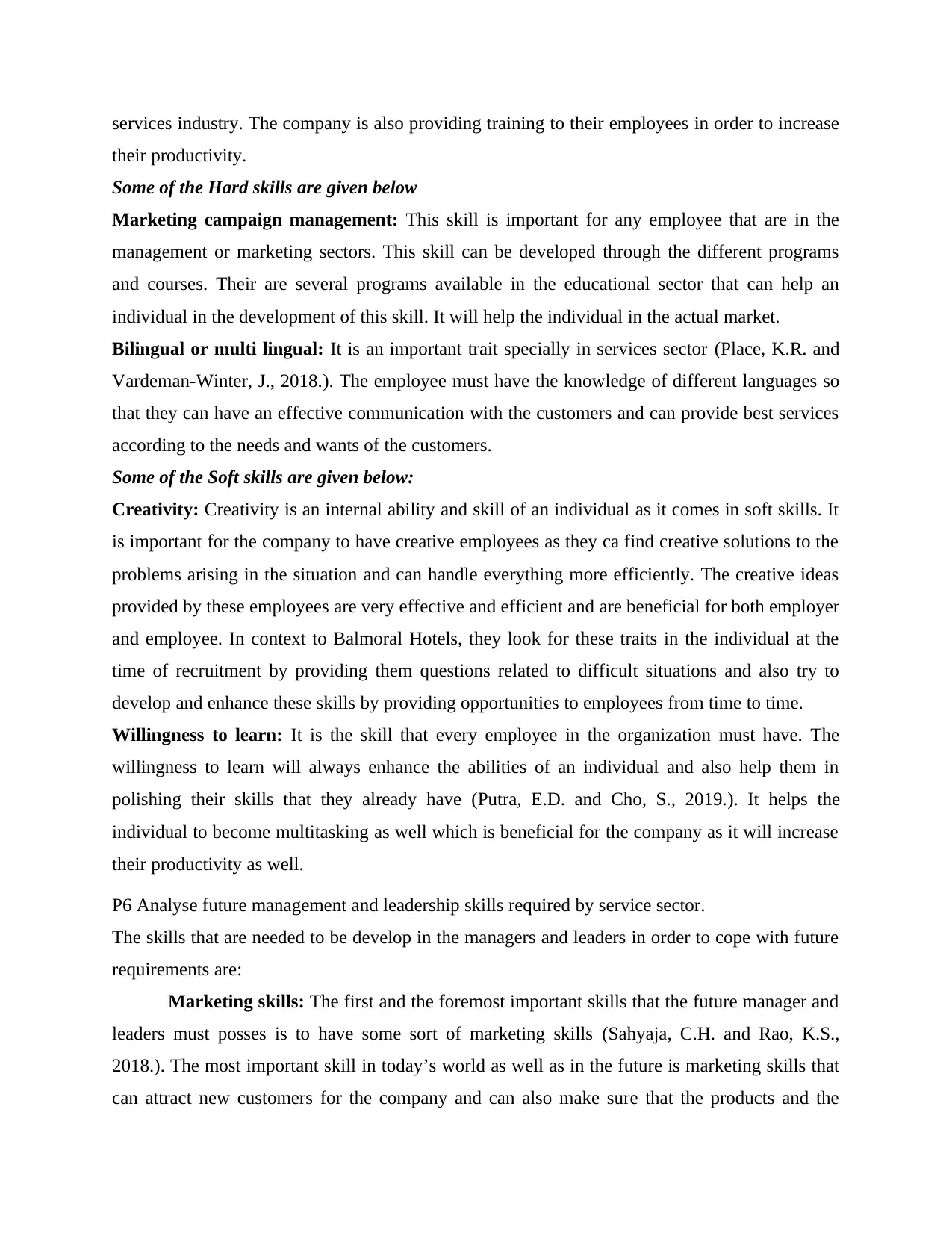
services industry. The company is also providing training to their employees in order to increase
their productivity.
Some of the Hard skills are given below
Marketing campaign management: This skill is important for any employee that are in the
management or marketing sectors. This skill can be developed through the different programs
and courses. Their are several programs available in the educational sector that can help an
individual in the development of this skill. It will help the individual in the actual market.
Bilingual or multi lingual: It is an important trait specially in services sector (Place, K.R. and
Vardeman-Winter, J., 2018.). The employee must have the knowledge of different languages so
that they can have an effective communication with the customers and can provide best services
according to the needs and wants of the customers.
Some of the Soft skills are given below:
Creativity: Creativity is an internal ability and skill of an individual as it comes in soft skills. It
is important for the company to have creative employees as they ca find creative solutions to the
problems arising in the situation and can handle everything more efficiently. The creative ideas
provided by these employees are very effective and efficient and are beneficial for both employer
and employee. In context to Balmoral Hotels, they look for these traits in the individual at the
time of recruitment by providing them questions related to difficult situations and also try to
develop and enhance these skills by providing opportunities to employees from time to time.
Willingness to learn: It is the skill that every employee in the organization must have. The
willingness to learn will always enhance the abilities of an individual and also help them in
polishing their skills that they already have (Putra, E.D. and Cho, S., 2019.). It helps the
individual to become multitasking as well which is beneficial for the company as it will increase
their productivity as well.
P6 Analyse future management and leadership skills required by service sector.
The skills that are needed to be develop in the managers and leaders in order to cope with future
requirements are:
Marketing skills: The first and the foremost important skills that the future manager and
leaders must posses is to have some sort of marketing skills (Sahyaja, C.H. and Rao, K.S.,
2018.). The most important skill in today’s world as well as in the future is marketing skills that
can attract new customers for the company and can also make sure that the products and the
their productivity.
Some of the Hard skills are given below
Marketing campaign management: This skill is important for any employee that are in the
management or marketing sectors. This skill can be developed through the different programs
and courses. Their are several programs available in the educational sector that can help an
individual in the development of this skill. It will help the individual in the actual market.
Bilingual or multi lingual: It is an important trait specially in services sector (Place, K.R. and
Vardeman-Winter, J., 2018.). The employee must have the knowledge of different languages so
that they can have an effective communication with the customers and can provide best services
according to the needs and wants of the customers.
Some of the Soft skills are given below:
Creativity: Creativity is an internal ability and skill of an individual as it comes in soft skills. It
is important for the company to have creative employees as they ca find creative solutions to the
problems arising in the situation and can handle everything more efficiently. The creative ideas
provided by these employees are very effective and efficient and are beneficial for both employer
and employee. In context to Balmoral Hotels, they look for these traits in the individual at the
time of recruitment by providing them questions related to difficult situations and also try to
develop and enhance these skills by providing opportunities to employees from time to time.
Willingness to learn: It is the skill that every employee in the organization must have. The
willingness to learn will always enhance the abilities of an individual and also help them in
polishing their skills that they already have (Putra, E.D. and Cho, S., 2019.). It helps the
individual to become multitasking as well which is beneficial for the company as it will increase
their productivity as well.
P6 Analyse future management and leadership skills required by service sector.
The skills that are needed to be develop in the managers and leaders in order to cope with future
requirements are:
Marketing skills: The first and the foremost important skills that the future manager and
leaders must posses is to have some sort of marketing skills (Sahyaja, C.H. and Rao, K.S.,
2018.). The most important skill in today’s world as well as in the future is marketing skills that
can attract new customers for the company and can also make sure that the products and the
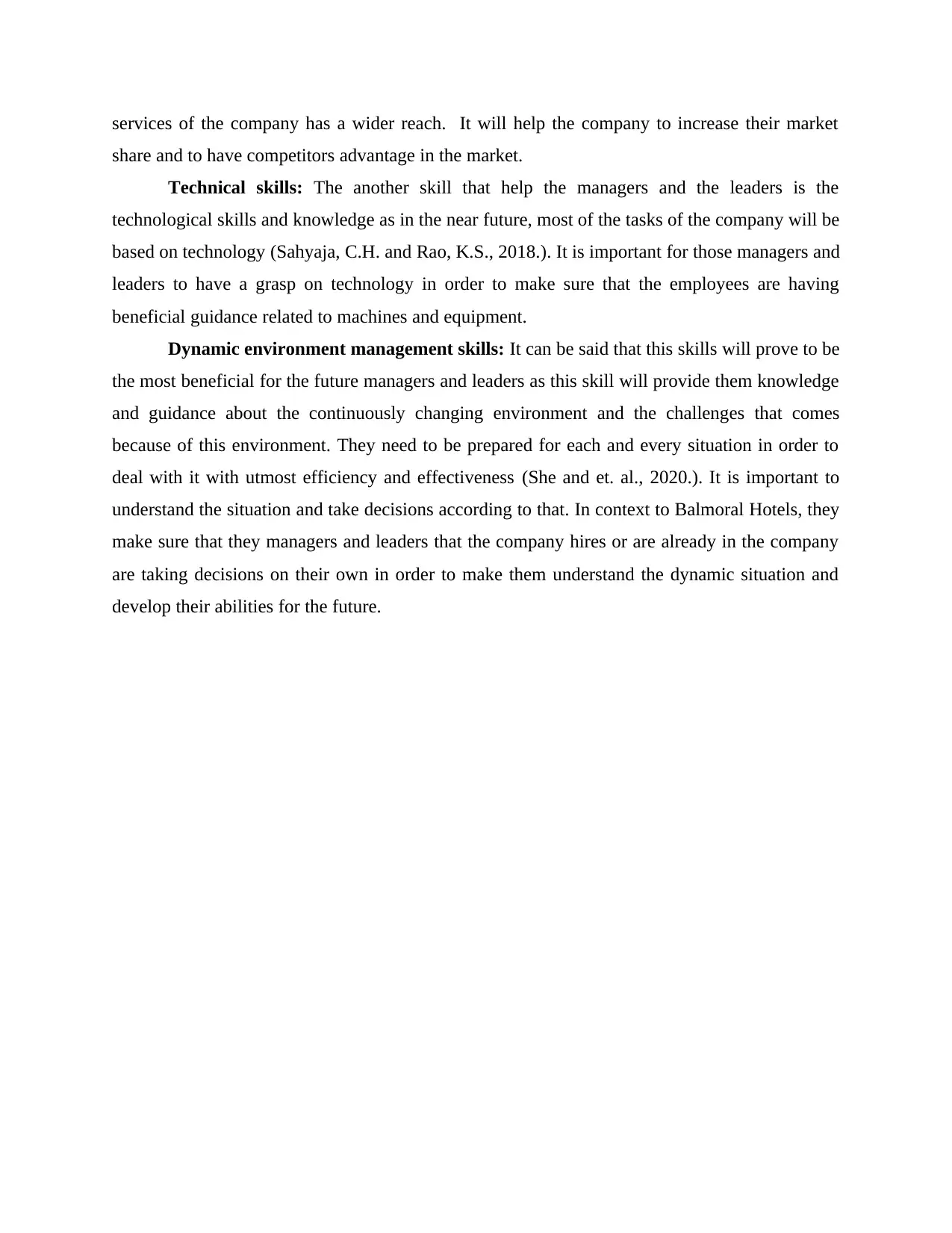
services of the company has a wider reach. It will help the company to increase their market
share and to have competitors advantage in the market.
Technical skills: The another skill that help the managers and the leaders is the
technological skills and knowledge as in the near future, most of the tasks of the company will be
based on technology (Sahyaja, C.H. and Rao, K.S., 2018.). It is important for those managers and
leaders to have a grasp on technology in order to make sure that the employees are having
beneficial guidance related to machines and equipment.
Dynamic environment management skills: It can be said that this skills will prove to be
the most beneficial for the future managers and leaders as this skill will provide them knowledge
and guidance about the continuously changing environment and the challenges that comes
because of this environment. They need to be prepared for each and every situation in order to
deal with it with utmost efficiency and effectiveness (She and et. al., 2020.). It is important to
understand the situation and take decisions according to that. In context to Balmoral Hotels, they
make sure that they managers and leaders that the company hires or are already in the company
are taking decisions on their own in order to make them understand the dynamic situation and
develop their abilities for the future.
share and to have competitors advantage in the market.
Technical skills: The another skill that help the managers and the leaders is the
technological skills and knowledge as in the near future, most of the tasks of the company will be
based on technology (Sahyaja, C.H. and Rao, K.S., 2018.). It is important for those managers and
leaders to have a grasp on technology in order to make sure that the employees are having
beneficial guidance related to machines and equipment.
Dynamic environment management skills: It can be said that this skills will prove to be
the most beneficial for the future managers and leaders as this skill will provide them knowledge
and guidance about the continuously changing environment and the challenges that comes
because of this environment. They need to be prepared for each and every situation in order to
deal with it with utmost efficiency and effectiveness (She and et. al., 2020.). It is important to
understand the situation and take decisions according to that. In context to Balmoral Hotels, they
make sure that they managers and leaders that the company hires or are already in the company
are taking decisions on their own in order to make them understand the dynamic situation and
develop their abilities for the future.
⊘ This is a preview!⊘
Do you want full access?
Subscribe today to unlock all pages.

Trusted by 1+ million students worldwide
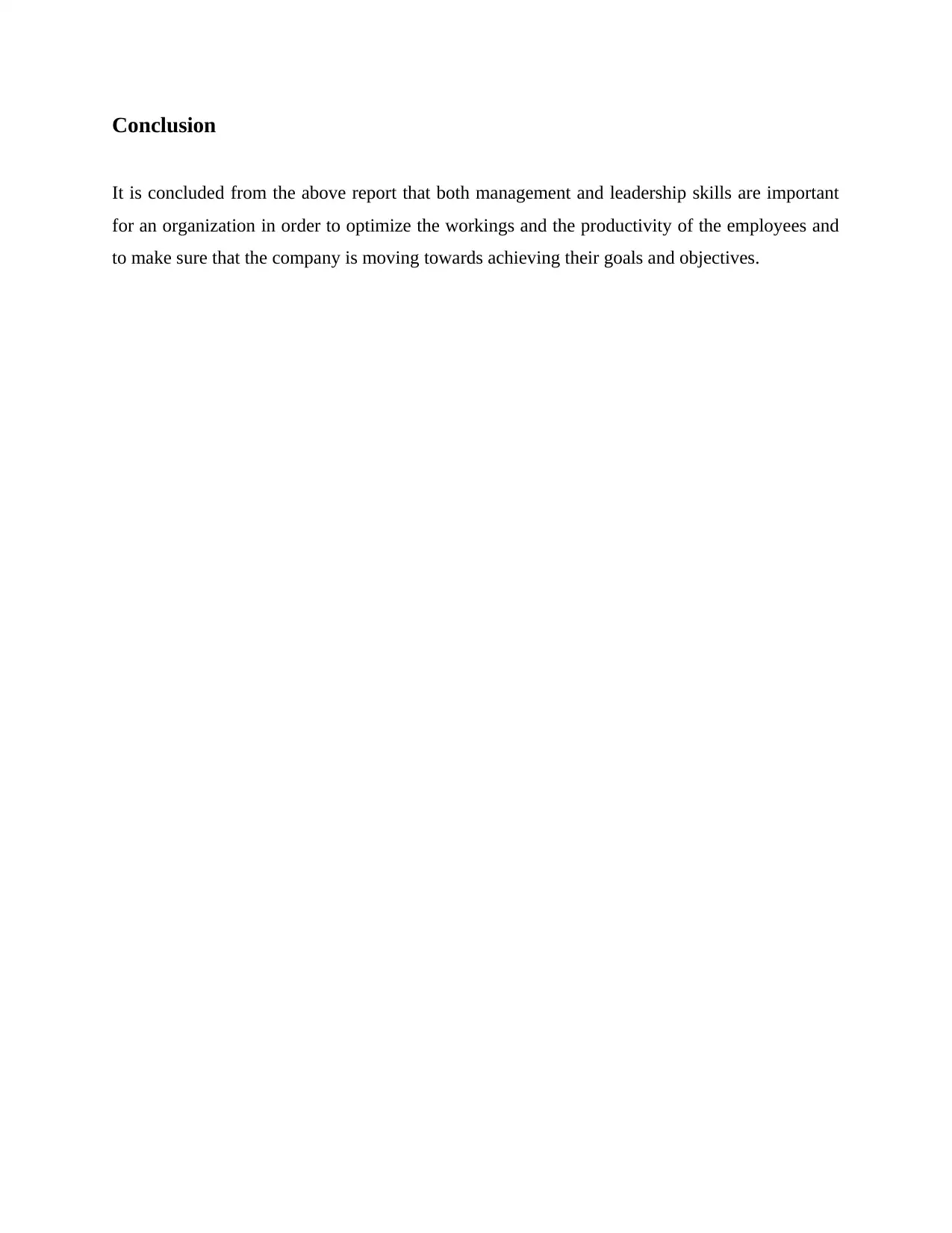
Conclusion
It is concluded from the above report that both management and leadership skills are important
for an organization in order to optimize the workings and the productivity of the employees and
to make sure that the company is moving towards achieving their goals and objectives.
It is concluded from the above report that both management and leadership skills are important
for an organization in order to optimize the workings and the productivity of the employees and
to make sure that the company is moving towards achieving their goals and objectives.
Paraphrase This Document
Need a fresh take? Get an instant paraphrase of this document with our AI Paraphraser
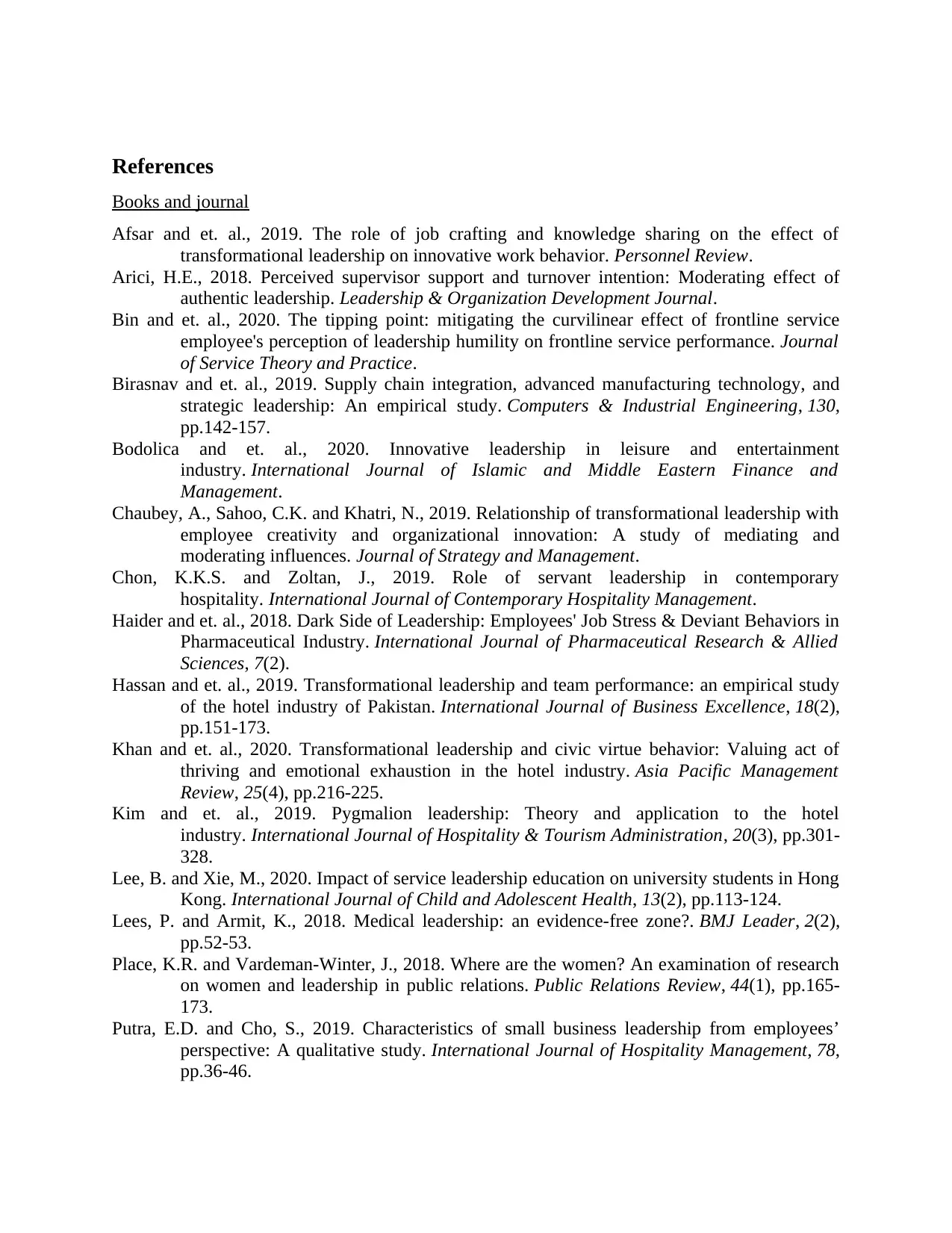
References
Books and journal
Afsar and et. al., 2019. The role of job crafting and knowledge sharing on the effect of
transformational leadership on innovative work behavior. Personnel Review.
Arici, H.E., 2018. Perceived supervisor support and turnover intention: Moderating effect of
authentic leadership. Leadership & Organization Development Journal.
Bin and et. al., 2020. The tipping point: mitigating the curvilinear effect of frontline service
employee's perception of leadership humility on frontline service performance. Journal
of Service Theory and Practice.
Birasnav and et. al., 2019. Supply chain integration, advanced manufacturing technology, and
strategic leadership: An empirical study. Computers & Industrial Engineering, 130,
pp.142-157.
Bodolica and et. al., 2020. Innovative leadership in leisure and entertainment
industry. International Journal of Islamic and Middle Eastern Finance and
Management.
Chaubey, A., Sahoo, C.K. and Khatri, N., 2019. Relationship of transformational leadership with
employee creativity and organizational innovation: A study of mediating and
moderating influences. Journal of Strategy and Management.
Chon, K.K.S. and Zoltan, J., 2019. Role of servant leadership in contemporary
hospitality. International Journal of Contemporary Hospitality Management.
Haider and et. al., 2018. Dark Side of Leadership: Employees' Job Stress & Deviant Behaviors in
Pharmaceutical Industry. International Journal of Pharmaceutical Research & Allied
Sciences, 7(2).
Hassan and et. al., 2019. Transformational leadership and team performance: an empirical study
of the hotel industry of Pakistan. International Journal of Business Excellence, 18(2),
pp.151-173.
Khan and et. al., 2020. Transformational leadership and civic virtue behavior: Valuing act of
thriving and emotional exhaustion in the hotel industry. Asia Pacific Management
Review, 25(4), pp.216-225.
Kim and et. al., 2019. Pygmalion leadership: Theory and application to the hotel
industry. International Journal of Hospitality & Tourism Administration, 20(3), pp.301-
328.
Lee, B. and Xie, M., 2020. Impact of service leadership education on university students in Hong
Kong. International Journal of Child and Adolescent Health, 13(2), pp.113-124.
Lees, P. and Armit, K., 2018. Medical leadership: an evidence-free zone?. BMJ Leader, 2(2),
pp.52-53.
Place, K.R. and Vardeman-Winter, J., 2018. Where are the women? An examination of research
on women and leadership in public relations. Public Relations Review, 44(1), pp.165-
173.
Putra, E.D. and Cho, S., 2019. Characteristics of small business leadership from employees’
perspective: A qualitative study. International Journal of Hospitality Management, 78,
pp.36-46.
Books and journal
Afsar and et. al., 2019. The role of job crafting and knowledge sharing on the effect of
transformational leadership on innovative work behavior. Personnel Review.
Arici, H.E., 2018. Perceived supervisor support and turnover intention: Moderating effect of
authentic leadership. Leadership & Organization Development Journal.
Bin and et. al., 2020. The tipping point: mitigating the curvilinear effect of frontline service
employee's perception of leadership humility on frontline service performance. Journal
of Service Theory and Practice.
Birasnav and et. al., 2019. Supply chain integration, advanced manufacturing technology, and
strategic leadership: An empirical study. Computers & Industrial Engineering, 130,
pp.142-157.
Bodolica and et. al., 2020. Innovative leadership in leisure and entertainment
industry. International Journal of Islamic and Middle Eastern Finance and
Management.
Chaubey, A., Sahoo, C.K. and Khatri, N., 2019. Relationship of transformational leadership with
employee creativity and organizational innovation: A study of mediating and
moderating influences. Journal of Strategy and Management.
Chon, K.K.S. and Zoltan, J., 2019. Role of servant leadership in contemporary
hospitality. International Journal of Contemporary Hospitality Management.
Haider and et. al., 2018. Dark Side of Leadership: Employees' Job Stress & Deviant Behaviors in
Pharmaceutical Industry. International Journal of Pharmaceutical Research & Allied
Sciences, 7(2).
Hassan and et. al., 2019. Transformational leadership and team performance: an empirical study
of the hotel industry of Pakistan. International Journal of Business Excellence, 18(2),
pp.151-173.
Khan and et. al., 2020. Transformational leadership and civic virtue behavior: Valuing act of
thriving and emotional exhaustion in the hotel industry. Asia Pacific Management
Review, 25(4), pp.216-225.
Kim and et. al., 2019. Pygmalion leadership: Theory and application to the hotel
industry. International Journal of Hospitality & Tourism Administration, 20(3), pp.301-
328.
Lee, B. and Xie, M., 2020. Impact of service leadership education on university students in Hong
Kong. International Journal of Child and Adolescent Health, 13(2), pp.113-124.
Lees, P. and Armit, K., 2018. Medical leadership: an evidence-free zone?. BMJ Leader, 2(2),
pp.52-53.
Place, K.R. and Vardeman-Winter, J., 2018. Where are the women? An examination of research
on women and leadership in public relations. Public Relations Review, 44(1), pp.165-
173.
Putra, E.D. and Cho, S., 2019. Characteristics of small business leadership from employees’
perspective: A qualitative study. International Journal of Hospitality Management, 78,
pp.36-46.
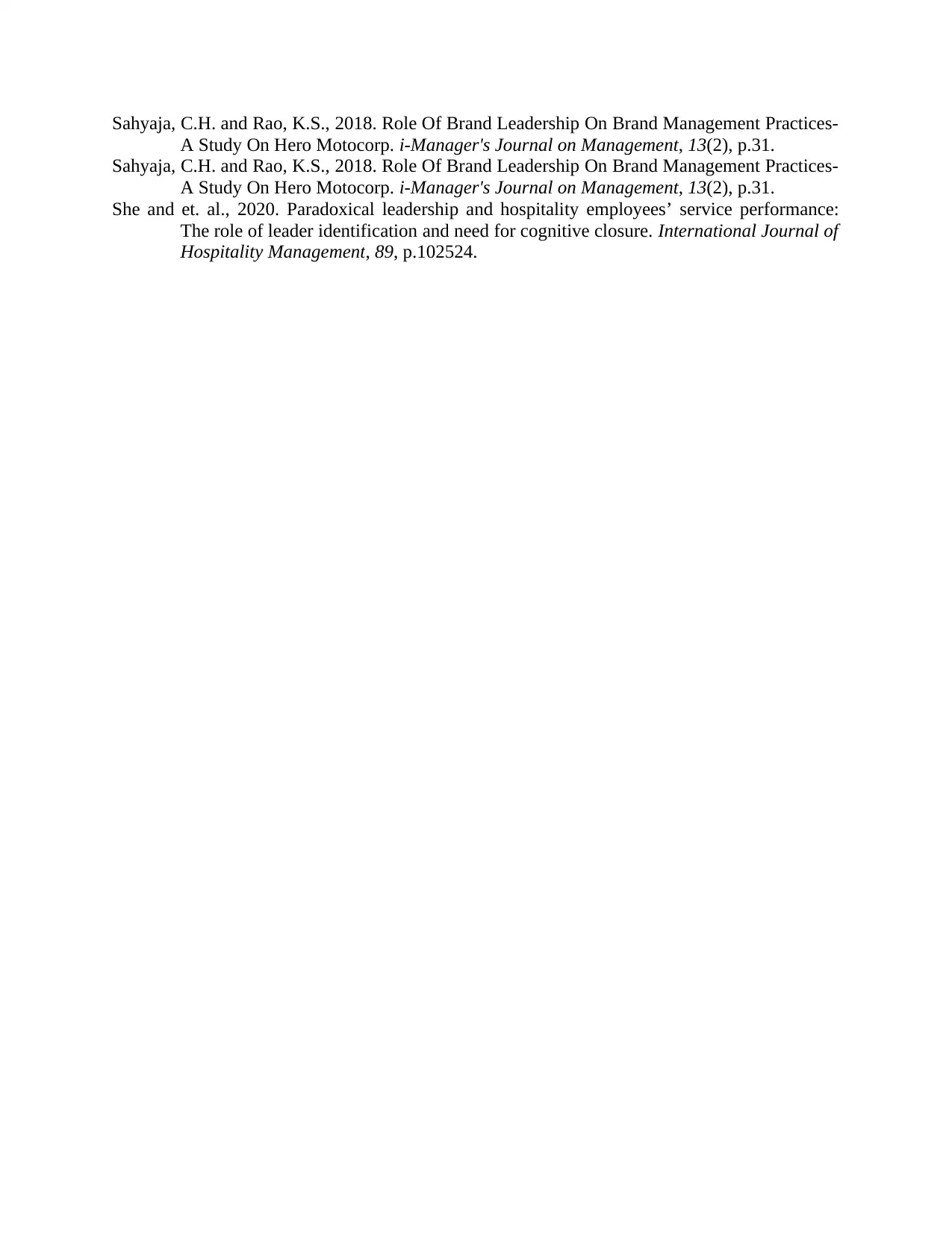
Sahyaja, C.H. and Rao, K.S., 2018. Role Of Brand Leadership On Brand Management Practices-
A Study On Hero Motocorp. i-Manager's Journal on Management, 13(2), p.31.
Sahyaja, C.H. and Rao, K.S., 2018. Role Of Brand Leadership On Brand Management Practices-
A Study On Hero Motocorp. i-Manager's Journal on Management, 13(2), p.31.
She and et. al., 2020. Paradoxical leadership and hospitality employees’ service performance:
The role of leader identification and need for cognitive closure. International Journal of
Hospitality Management, 89, p.102524.
A Study On Hero Motocorp. i-Manager's Journal on Management, 13(2), p.31.
Sahyaja, C.H. and Rao, K.S., 2018. Role Of Brand Leadership On Brand Management Practices-
A Study On Hero Motocorp. i-Manager's Journal on Management, 13(2), p.31.
She and et. al., 2020. Paradoxical leadership and hospitality employees’ service performance:
The role of leader identification and need for cognitive closure. International Journal of
Hospitality Management, 89, p.102524.
⊘ This is a preview!⊘
Do you want full access?
Subscribe today to unlock all pages.

Trusted by 1+ million students worldwide
1 out of 13
Related Documents
Your All-in-One AI-Powered Toolkit for Academic Success.
+13062052269
info@desklib.com
Available 24*7 on WhatsApp / Email
![[object Object]](/_next/static/media/star-bottom.7253800d.svg)
Unlock your academic potential
Copyright © 2020–2026 A2Z Services. All Rights Reserved. Developed and managed by ZUCOL.





